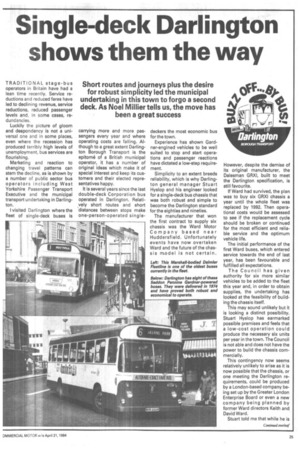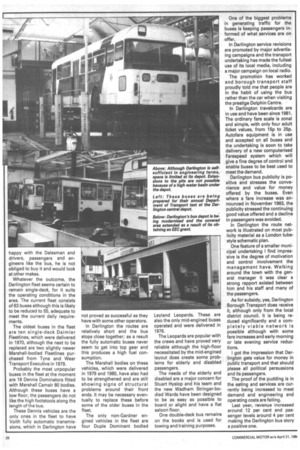Single-deck Darlington shows them the way
Page 27

Page 28

If you've noticed an error in this article please click here to report it so we can fix it.
Short routes and journeys plus the desire for robust simplicity led the municipal undertaking in this town to forgo a second deck. As Noel Millier tells us, the move has been a great success
TRADITIONAL stage-bus operators in Britain have had a lean time recently. Service reductions and reduced fares have led to declining revenue, service reductions, reduced passenger levels and, in some cases, redundancies.
Luckily the picture of gloom and despondency is not a universal one and in some places, even where the recession has produced terribly high levels of unemployment, bus services are flourishing.
Marketing and reaction to changing travel patterns can stem the decline, as is shown by a number of public sector bus operators including West Yorkshire Passenger Transport Executive and the municipal transport undertaking in Darlington.
I visited Darlington where the fleet of single-deck buses is
carrying more and more passengers every year and where operating costs are falling. Although to a great extent Darlington Borough Transport is the epitome of a British municipal operator, it has a number of original ideas which make it of special interest and keep its customers and their elected representatives happy.
It is several years since the last double-deck Corporation bus operated in Darlington. Relatively short routes and short distances between stops make one-person-operated single deckers the most economic bus for the town.
Experience has shown Gardner-engined vehicles to be well suited to stop and start operations and passenger reactions have dictated a low-step requirement.
Simplicity to an extent breeds reliability, which is why Darlington general manager Stuart Hyslop and his engineer looked for a single-deck bus chassis that was both robust and simple to become the Darlington standard for the eighties and nineties.
The manufacturer that won the first contract to supply six chassis was the Ward Motor Company based near Huddersfield. Unfortunately events have now overtaken Ward and the future of the chassis model is not certain. However, despite the demise of its original manufacturer, the Dalesman GRXI, built to meet the Darlington specification, is still favourite.
If Ward had survived, the plan was to buy six GRXI chassis a year until the whole fleet was replaced by 1992. Then operational costs would be assessed to see if the replacement cycle should be broken or continued for the most efficient and reliable service and the optimum vehicle life.
The initial performance of the first Ward buses, which entered service towards the end of last year, has been favourable and fulfilled all expectations.
The Council has given authority for six more similar vehicles to be added to the fleet this year and, in order to obtain supplies, the undertaking has looked at the feasibility of building the chassis itself.
This may sound unlikely but it is looking a distinct possibility. Stuart Hyslop has earmarked possible premises and feels that a low-cost operation could produce the necessary six units per year in the town. The Council is not able and does not have the power to build the chassis commercially.
This contingency now seems relatively unlikely to arise as it is now possible that the chassis, or one meeting the Darlington requirements, could be produced by a London-based company being set up by the Greater London Enterprise Board or even a new company being planned by former Ward directors Keith and David Ward.
Stuart told me that while he is happy with the Dalesman and drivers, passengers and engineers like the bus, he is not obliged to buy it and would look at other makes.
Whatever the outcome, the Darlington fleet seems certain to remain single-deck, for it suits the operating conditions in the area. The current fleet consists of 63 buses although this is likely to be reduced to 55, adequate to meet the current daily requirements.
The oldest buses in the fleet are ten single-deck Daimler Fleetlines, which were delivered in 1970, although the next to be replaced are two slightly newer Marshall-bodied Fleetlines purchased from Tyne and Wear Transport Executive in 1979.
Probably the most unpopular buses in the fleet at the moment are 18 Dennis Dominators fitted with Marshall Camair 80 bodies. Although these buses have a low floor, the passengers do not like the high footstools along the length of the bus.
These Dennis vehicles are the only ones in the fleet to have Voith fully automatic transmissions, which in Darlington have not proved as successful as they have with some other operators.
In Darlington the routes are relatively short and the bus stops close together; as a result the fully automatic buses never seem to get into top gear and this produces a high fuel consumption.
The Marshall bodies on these vehicles, which were delivered in 1979 and 1980, have also had to be strengthened and are still showing signs of structural problems around their front ends. It may be necessary eventually to replace these before some of the older buses in the fleet.
The only non-Gardner engined vehicles in the fleet are four Duple Dominant bodied Leyland Leopards. These are also the only mid-engined buses operated and were delivered in 1976.
The Leopards are popular with the crews and have proved very reliable although the high-floor necessitated by the mid-engined layout does create some problems for elderly and disabled passengers.
The needs of the elderly and disabled are a major concern for Stuart Hyslop and his team and the new Wadham Stringer-bodied Wards have been designed to be as easy as possible to board or alight and have a flat saloon floor.
One double-deck bus remains on the books and is used for towing and training purposes. One of the biggest problems in generating traffic for the buses is keeping passengers informed of what services are on offer.
In Darlington service revisions are promoted by major advertising campaigns and the transport undertaking has made the fullest use of its local media, including a major campaign on local radio.
The promotion has worked and borough transport staff proudly told me that people are in the habit of using the bus rather than the car when visiting the prestige Dolphin Centre.
In Darlington travelcards are in use and have been since 1981. The ordinary fare scale is zonal and simple, with only four adult ticket values, from 15p to 25p. Autofare equipment is in use and accepted on all buses and the undertaking is soon to take delivery of a new computerised Farespeed system which will give a fine degree of control and enable buses to be best used to meet the demand.
Darlington bus publicity is positive and stresses the convenience and value for money offered by the buses. Even where a fare increase was announced in November 1983, the publicity stressed the continuing good value offered and a decline in passengers was avoided.
In Darlington the route network is illustrated on most publicity material as a London tubestyle schematic plan.
One feature of a smaller municipal undertaking I find impressive is the degree of motivation and control involvement the management have. Walking around the town with the general manager it was clear a strong rapport existed between him and his staff and many of the passengers.
As for subsidy, yes, Darlington Borough Transport does receive it, although only from the local district council. It is being reduced significantly and a completely viable network is possible although with some fare increases and early morning or late evening service reductions.
I got the impression that Darlington gets value for money in public transport and that should please all political persuasions and its passengers.
The proof of the pudding is in the eating and services are currently being increased to meet demand and engineering and operating costs are falling.
Last year, revenue increased around 12 per cent and passenger levels around 4 per cent making the Darlington bus story a positive one.




















































































